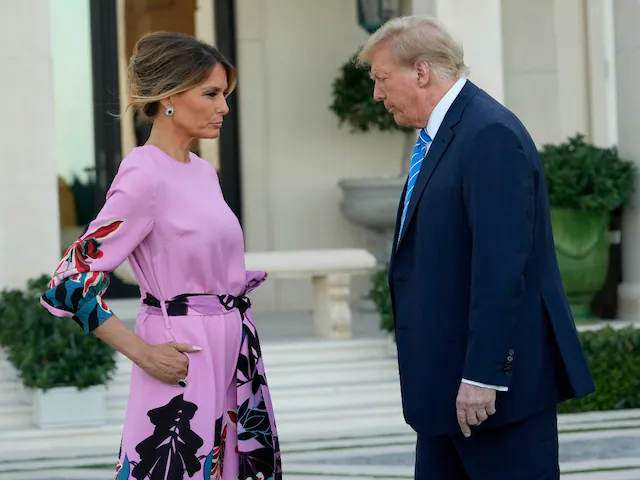The trial of Donald Trump has provided a rare glimpse into his marriage with Melania, as described by witnesses from his inner circle.
The former President, now the first to have been convicted, saw his marriage to the 54-year-old former model scrutinized after explosive allegations from former porn star Stormy Daniels about a one-night stand in 2006.
Unlike some of Trump’s children, Melania Trump did not attend the Manhattan court trial.
A witness who was close to Trump during his presidency between 2016 and 2020 described their relationship as “just like any other marriage.”
In the evenings, when Trump was busy in the Oval Office, he often had his personal secretary, Madeleine Westerhout, call the First Lady.
“To let her know that he was running late,” Westerhout testified at Trump’s trial. “Like: ‘Honey, I’m going to be late for dinner.’”
Westerhout, 33, who also teared up while recounting her dismissal from Trump’s team, provided a glowing portrayal of the Trump marriage, describing it as a relationship of mutual respect. She recalled moments when Trump would call Melania just to check in and wave to her from the Oval Office window.
However, other witnesses painted a less idyllic picture of a marriage that has long been the subject of public curiosity and speculation. Michael Cohen, Trump’s former attorney, pointed to Trump’s blasé attitude toward his wife’s potential reaction to allegations of his infidelity.
“Don’t worry,” Trump reportedly said. “How long do you think I will be on the market for? Not long.”
It also emerged that Trump and Melania slept in separate bedrooms on separate floors and seemingly lived separate lives.
The trial focused on whether Trump falsified business records to hide a hush money payment to Stormy Daniels just before the 2016 election.
This offense, usually a misdemeanor, becomes a felony if done to conceal another crime. Prosecutors argued that the other crime was an illegal attempt to influence the election by keeping Daniels’s story from voters.
The jury convicted Trump on all 34 counts, dismissing his defense that the payment was solely to keep Melania from finding out.
Daniels, 45, testified that Trump was unbothered by the idea of his wife discovering their affair. She described meeting Trump at a celebrity golf tournament in 2006 and later dining with him in his hotel suite.
When she asked about his wife, Trump allegedly responded, “Oh, don’t worry about that. We actually don’t even sleep in the same room.”
Her account aligned with reports by Mary Jordan, Melania Trump’s biographer, who said that the couple had separate bedrooms both at Trump’s properties and in the White House.
She described how Trump preferred a dark color scheme and early morning TV sessions, while Melania had different tastes and habits. A former housekeeper even claimed their rooms were on different floors.
During the trial, Daniels and other witnesses cast doubt on Trump’s concern over his wife learning about his affairs.
She testified that Trump never asked her to keep their affair secret and showed little concern about his wife finding out.
David Pecker, publisher of the National Enquirer, testified that before Trump’s presidential campaign, he worried about Melania and Ivanka’s reactions to negative stories. But once he began his campaign, his concern shifted to the election’s impact.
Meanwhile, Trump’s former communications director, Hope Hicks, offered a more nuanced perspective.
She recalled Trump’s concern about Melania reading about his alleged infidelity in the Wall Street Journal. Hicks testified that Trump asked for newspapers to be withheld from their residence to avoid hurting his family.
The jury eventually found him guilty on each of the 34 counts of falsifying business records to hide a payment meant to silence Ms. Daniels. He could, in theory, be sentenced to four years behind bars for each count but is more likely to receive probation.
The 77-year-old Republican, who was released without bail, is now a felon — a historic and startling first in a country where presidents are frequently described as the most powerful person in the world.
Trump, however, is not barred from continuing his battle to unseat President Joe Biden in November — even in the unlikely event he goes to prison.
His lawyer, Todd Blanche, said his team was eyeing an appeal “as soon as we can.”
And Trump himself voiced immediate defiance.
“I’m a very innocent man,” Trump told reporters, vowing that the “real verdict” would come from voters on election day. He branded the trial “rigged” and a “disgrace.”
Biden’s campaign issued a statement saying the trial showed “no one is above the law.” It added that “the threat Trump poses to our democracy has never been greater.”
Judge Juan Merchan set sentencing for July 11 — four days before the Republican National Convention in Milwaukee, where Trump is due to receive the party’s formal nomination.
The 12-member jury had deliberated for more than 11 hours over two days before the foreman read out the unanimous conclusion within a matter of minutes.
Merchan thanked the jurors for completing the “difficult and stressful task.”
Their identities had been kept secret throughout proceedings, a rare practice more often seen in cases involving mafia or other violent defendants.
Trump also faces federal and state charges of conspiring to overturn the results of the 2020 election won by Biden and for hoarding secret documents after leaving the White House.
However, those trials — on far weightier alleged crimes — are unlikely to get underway before the presidential election.


















